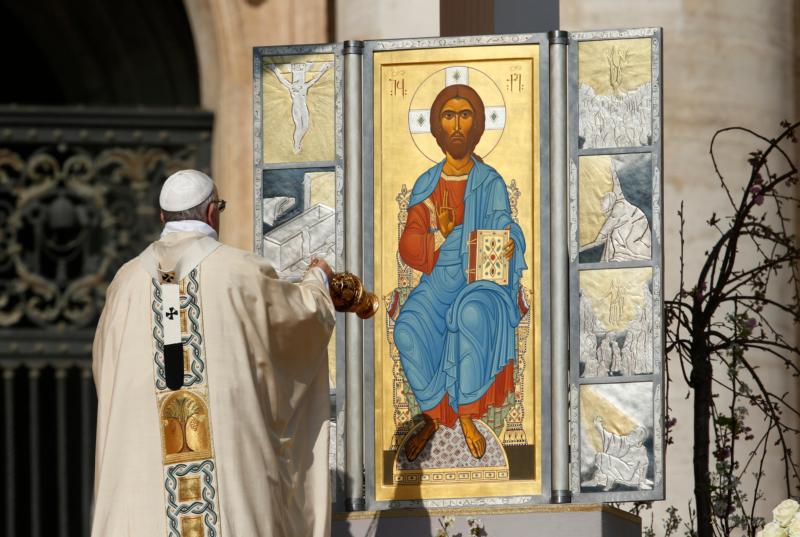
Pope Francis uses incense to reverence an icon of the risen Jesus at the beginning of 2016 Easter Mass in St. Peter’s Square at the Vatican. The universal call to be evangelizers is nothing new, as it comes from Jesus himself and was issued that first Easter morning. (CNS photo/Paul Haring)
In the teaching of the Second Vatican Council and of all the popes since, we hear over and over again that evangelization is the primary task of the church. In fact, in 1990, St. John Paul II declared, “I sense that the moment has come to commit all of the church’s energies to a new evangelization.”
What’s more, we are also told that all of us, regardless of personality type or skill set, are called to be evangelizers. This generally makes Catholics squirm. Most of us feel unsuited, unprepared, incompetent. Can’t we leave this to the clergy and the religious education professionals?
The universal call to be evangelizers is nothing new. It comes from Jesus himself and was issued that first Easter morning. He commands the women who are the first to discover the empty tomb to “go tell” the disciples what they have seen and experienced (Mt 28:10).
[hotblock]
Then it’s the turn of the two disciples on the road to Emmaus who hasten back to Jerusalem to tell the apostles what happened to them (Lk 24). A few weeks later, the apostles are told by the Lord that they will be his witnesses to the ends of the earth (Acts 1:8).
Like Moses, we protest that we are not eloquent enough. And we point out that we don’t know theology well enough to refute arguments and demonstrate the truth of the faith. And we certainly are not saints yet … our moral imperfections are, in fact, most embarrassing.
Yet Jesus chose witnesses who were uneducated and highly imperfect. It is unlikely that either the apostles or Mary Magdalene had theology degrees from Jerusalem Rabbinical Academy. And, when it comes to sanctity, all but the mother of Jesus fall a bit short.
Mary Magdalene, just a year or two prior to the Resurrection, had been running around in the company of seven demons. Peter denied Jesus three times just a few days before Easter morning. And they all, save the beloved disciple, had abandoned Jesus as he was dragged from the garden and nailed to the cross.
Yet he nonetheless commissioned these highly flawed people to take the good news to all nations.
To explain why they were and we are capable of doing this, let’s analyze the role of a witness in a law court.
[tower]
A witness is not charged with making a coherent, comprehensive case for or against someone who is on trial. The witness is simply called upon to answer a series of questions of what he or she has seen or heard. The role of witnesses is simply to tell, when prompted, their experiences.
Mary Magdalene and the apostles were eyewitnesses of the risen Christ. More than 500 disciples shared in this experience, according to Paul (1 Cor 15). They could bear witness to seeing him bodily. We today obviously cannot.
But the Gospel, the good news, is that through the death and resurrection of Jesus Christ, all sin is forgiven. He, who will be the judge, died to acquit us all. People have only to accept this forgiveness to experience freedom and profound peace.
Peter, Thomas, Mary Magdalene and all of them knew the sweetness of his forgiveness in the face of the bitterness of their sin. And so do we.
Though the fullness of the risen life is yet to come for us, we have experienced being reborn through the resurrection of Jesus and his gift of the Holy Spirit, the down payment of the treasure reserved for us in heaven.
So how do we know the resurrection of Jesus is for real? Because we experience its effect in our lives now through the peace and joy brought by the Holy Spirit, our Easter gift.
The greeting of the Lord to the apostles gathered in the cenacle on Easter Sunday afternoon was “peace be with you.” It’s true that on Pentecost (Acts 2), it was Peter who gave the speech. But it was the uncontainable joy and excitement of the 120 disciples that had drawn the crowd (Acts 1).
We all have experienced something of the Lord’s mercy, the power of his forgiveness, the movement of the Spirit. Each one of us has a story of the impact of Easter on our lives.
Being witnesses to the good news of Easter means being able and willing simply to share a bit of our story, to give testimony from our experience. People can argue with opinions and reasoning. But they really can’t argue with someone’s experience.
If you want your words to be credible, take a look at your life. It need not be perfect. If you are like anyone else, your life is full of unresolved problems, unanswered prayers and faults of various shapes and sizes.
But if there is a quiet peace beneath the chaos, if there is joy despite the trials, your words will get the attention of many.
And especially, if your face reflects the love of the Father — the God who “so loved the world” — if people can feel from you the genuine interest and affection that the Father has for you and for them, then your testimony will have a great chance of touching hearts and inspiring faith.
***
D’Ambrosio, aka “Dr. Italy,” writes from Texas. For more info about his resources and pilgrimages to the Holy Land, visit dritaly.com or connect with him on Twitter @DrItaly.



Share this story